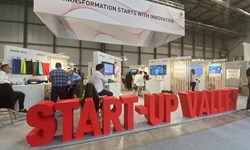
Evolution St Louis implements automated production to revive textile industry
-By Otis Robinson
Otis Robinson talks with John Elmuccio, COO and founder of Evolution St Louis, about the company’s plans to use automation to revive a once-thriving textile sector in the midwestern city of St Louis, US.
From the 19th century to the mid-1950s, the textile industry in St Louis, US was regarded as ‘second only to New York in terms of garment manufacturing”, according to the St Louis Fashion Fund (SLFF). With Washington Avenue having housed ‘more shoe manufacturers than any other street in the world’, its footprint in the textile world led to its moniker as ‘Shoe Street, USA’.
In recent years, however, the St Louis garment sector has blurred into obscurity and its footprint has been blanketed by popular artist lofts, galleries, restaurants and nightlife. And as competition in the contemporary garment industry proliferates from fast fashion trends, the midwestern city, located on the western bank of the Mississippi River along the periphery of Missouri, may require a small push towards its former potential. Many local companies increasingly believe the path back to success lies in new, innovative business models generated by Industry 4.0 technologies.
New opportunities
Founded in 2014 by Susan Sherman, the SLFF is an incubator that ‘supports emerging designers’ and ‘promotes fashion education and outreach’ to build upon its vision of a revived, impactful St Louis garment industry. The organisation secondarily aims to attract manufacturers and production processes to the city to “enrich St Louis through the business of fashion via [several] pillars: [the] economic growth and revitalisation of St Louis’ garment district and education and community outreach,” the company says.
On the lookout for those sharing the SLFF’s goal, Sherman happened to come across John Elmuccio, the chief operating officer (COO) and founder of a then-untitled, high-tech garment manufacturing facility with no confirmed location for development. Elmuccio had been endlessly searching for the perfect city to commence production when he received an important call from the SLFF’s president.
“Sherman, who is a huge fashionista and very well-connected to the arts in St Louis, gave me a call out of the blue,” Elmuccio says. Through Elmuccio’s own endeavours along the textile grapevine, talk of his unique Industry 4.0 concepts had reached the advisory board for the SLFF. Coincidentally, as the organisation reached out, Elmuccio was incredibly close to setting up business in Detroit, Michigan, US. “She said: ‘I heard what you’re doing [there]. My husband and I are [currently] in New York – don’t sign anything until you have a drink with us.’
“We met and she told me about St Louis. I had not realised, although I had been to St Louis many times, that at one point it was the second largest apparel manufacturing centre in the US,” adds Elmuccio. “They were very interested in what we had to say [about manufacturing].”
High-tech manufacturing
Elmuccio’s experience in the garment and fashion industry could be considered unrivalled. Kicking his career off as an assistant buyer at a popular US retailer in the 1970s, Elmuccio went on to increase his knowledge of the industry in roles such as outerwear designer, senior vice president of sales, company founder (one being a private label business and the other a supply chain consultancy) and more. However, it was Elmuccio’s knowledge of automated technologies, coupled with a high-tech manufacturing concept that snatched the attention of the SLFF.
“My partner [Jon Lewis] and I started to see dynamic shifts happening in retail environments,” he says, citing the shift from standard retailing towards ecommerce. “The online [fashion] business was the future and we didn’t see a supply chain that was built to sustain that in the US.
“We started thinking about how we can bring back manufacturing to the US in a unique way. I was very interested in the technology that was evolving in flatbed knitting. We loved [Stoll’s] machinery, we loved their knitwear technology. […] We [now] have a great partner and collaborator in Stoll for training and ongoing support.
“In our initial purchase, we will buy a range of Stoll’s latest technology, and in addition to Stoll’s M1plus software (an “effective solution to producing patterns for highly-optimised knitting processes”), we will be taking advantage of their latest KI software (knit intelligence, also known as knitelligence),” he says.
Elmuccio and Lewis’ plan is to use this innovative technology to fill the ‘white space’ in the industry’s supply chain: while bigger retailers sourced from countries such as China for runs of 500 up to 5,000, ‘better brands’, such as designers, had experienced difficulty in finding a manufacturer able to produce lesser runs. Their company would therefore offer smaller production runs that traditional garment production models cannot, and though the company is capable of mass production, Elmuccio says its unique angle is the ability to cater to these varied numerical requirements.
The untitled company’s united vision with Stoll was immensely popular in the St Louis community (Elmuccio says the US is a ‘virtually untapped market’ for Stoll’s new technologies) and his company saw ‘tremendous outreach’ from brands. Meanwhile, the local investment community embraced the founders with ‘open arms’, enamoured by the technology’s ability to recapture St Louis’ previously bustling heritage. One supporter even sourced the company’s eventual locale, a 32,000 sq ft property in St Louis’ Grand Center, situated near to the Pulitzer Arts Foundation. With plans to install 80 Stoll knitting machines at the facility, Elmuccio summarises what his company will represent for the US industry: “So, our company, titled Evolution St Louis, will be the first fully high-tech flatbed knitting facility in the US.
Elmuccio continues: “On our main floor, we can fit 50 machines, and we have room for another 40. We’ll have room for yarn storage and design and programming. We’ll have a lot of open space, for example, in our employee lounge. What we really wanted to do was build a factory of the future. The environment we want to create is very modern, very contemporary.”
The potential of automation
In collaboration with Stoll, the company expects to begin development in August. While Evolution St Louis staff undergo training from designers and staff at the OEM, the machines are set to be installed sooner rather than later to meet demand. As time passes, Elmuccio has noticed growing interest from local brands who have become tired of the lengthy lifecycle of their standard, established design-to-delivery processes – especially in the current era of fast fashion, when designer trends are expected to be available to purchase right from the moment the garment hits the Parisian runway. Evolution St Louis’ automated production model is a step in the right direction, Elmuccio suggests.
“[Big brands] can’t respond quickly [enough] to what’s happening. It used to be that people would see things in a magazine that were on a Paris runway, and a year later they’d be able to buy it in store. Now, people see it on the runway on their phones and want it now.”
The company’s belief in Industry 4.0 on-demand solutions is reaffirmed by Elmuccio’s enthusiasm for automated technologies. He says: “We’ll bring in automated steam tables [too], where you just lay [the garment] down and it comes out. All that kind of technology is available. As much as we can, we plan on automating the process.”
This unique mode of garment production is distinctive within the US industry and Elmuccio plans to reignite the country’s textile industry by repositioning manufacturing into its centre. However, Evolution St Louis wants to avoid being coupled with the word ‘reshoring’.
“We don’t want the jobs that are in China,” he says. “We want to build the supply chain of the future.”
The future
Evolution St Louis, with the support of both the SLFF and Stoll, has plans to scale up eventually, but the company’s first and foremost priority is to forge an opportunistic industry sector in the midwestern, US town using its new digitalised business model. The first step, he says, was recognition from the SLFF; secondly will be the implementation of the fully-automated manufacturing process, using Stoll machinery; and finally, the company will begin enticing brands back to St Louis in order to ‘reenergise that whole sector’ and ‘build a flatbed knitting sector in the US’.
“Our trademarked phrase – reinvent, recreate, reignite – really says everything we want to do,” says Elmuccio.
The company’s forward-thinking business model is mirrored by Elmuccio’s detailed plan for its future: “We’ve also had outreach from the automotive industry and the medical industry,” he says. “Once we establish our base within the designer fashion industry, [we can] be in the high-performance sportswear, automotive industry, shoes, and all that.
“That’s what the city is excited about. That’s what we believe is possible.”
Have your say. Tweet and follow us @WTiNcomment







